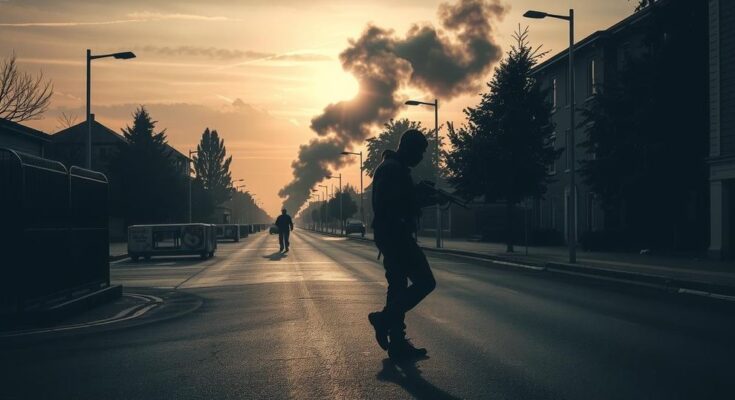Gunfire erupted in Goma, DR Congo as Congolese soldiers clashed with Rwandan-backed militias, complicating an already critical humanitarian crisis. Armed protesters attacked multiple embassies in Kinshasa, accusing the international community of inaction. The UN reported significant casualties and food shortages due to the escalating violence, with calls for stronger diplomatic intervention. Historical ethnic tensions continue to fuel conflict, making resolution efforts increasingly necessary.
Gunfire echoed across Goma, DR Congo on Tuesday as clashes erupted between Congolese soldiers and militia backed by Rwandan forces. This escalation follows an incursion by the Tutsi-led M23 armed group into Goma, which has been a focal point of conflict for years. The violence has intensified the humanitarian crisis, displacing approximately 500,000 people since January, as reported by the UN refugee agency.
Protesters in Kinshasa expressed their outrage towards international inaction, attacking embassies, including those of Rwanda, France, Belgium, and the United States. Kenya’s Foreign Affairs Principal Secretary condemned the assaults on embassies, categorizing them as demonstrations of discontent. The US embassy issued a warning to citizens to remain indoors due to the escalating tensions.
Despite ongoing gunfire, the intensity of the conflict in Goma appeared to diminish by Tuesday. The city, already housing over 700,000 internally displaced individuals, is situated along Lake Kivu, bordering Rwanda. Local residents reported incidents of looting by both Congolese soldiers and militia, with accounts of theft and violence surfacing from multiple neighborhoods.
The situation in Goma remains precarious, with reports indicating at least 17 deaths and over 367 injuries from the recent conflicts. The United Nations announced that food assistance efforts have been halted, raising concerns regarding food shortages as residents brace for critical days ahead, according to the World Food Programme.
The Congolese government has sought stronger international support following a prior UN Security Council meeting that failed to hold Rwanda accountable. Claims have been made against Rwanda regarding its motives in the resource-rich region, with the Rwandan government asserting that its interests lie in combatting a rebel group formed post-genocide. Meanwhile, diplomatic discussions are taking place at various levels, including an emergency summit involving Congolese and Rwandan leaders.
The crisis has deep historical roots, tracing back to the 1994 Rwandan genocide and the subsequent conflict in the region. The M23, victorious in the past, resurfaced in late 2021, reigniting tensions in North Kivu province. Following the failure of a ceasefire in August and the cancellation of peace talks, the likelihood of sustained peace remains uncertain. The situation in Goma thus represents a complex interplay of humanitarian needs, international politics, and ethnic conflicts that require urgent attention.
The ongoing violence in the Democratic Republic of Congo stems from historical ethnic tensions exacerbated by the genocide in Rwanda in 1994. The M23 armed group, primarily composed of Tutsi fighters, has repeatedly sought control in the mineral-rich eastern DRC, leading to recurrent conflicts. With regional powers involved and a humanitarian crisis deepening due to mass displacements and violence, this situation necessitates comprehensive international diplomatic efforts and intervention.
The unrest in Goma highlights the dire humanitarian needs and underlying political turmoil in the DRC, reflecting decades of conflict rooted in regional and ethnic rivalries. With ongoing clashes and diplomatic tensions, it is vital for both national and international bodies to address the humanitarian crisis and seek lasting solutions to prevent further escalation of violence. The urgent need for food and security in the region must be prioritized to alleviate the suffering of the displaced population.
Original Source: www.wfxg.com




